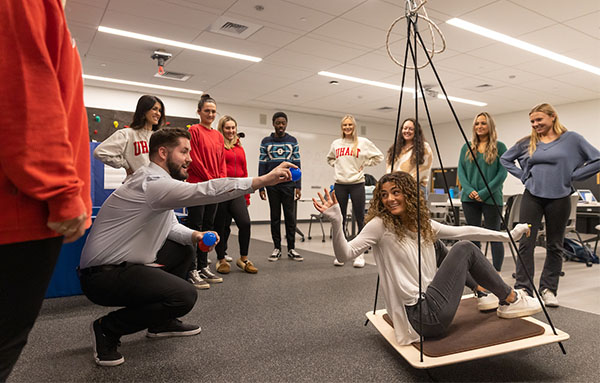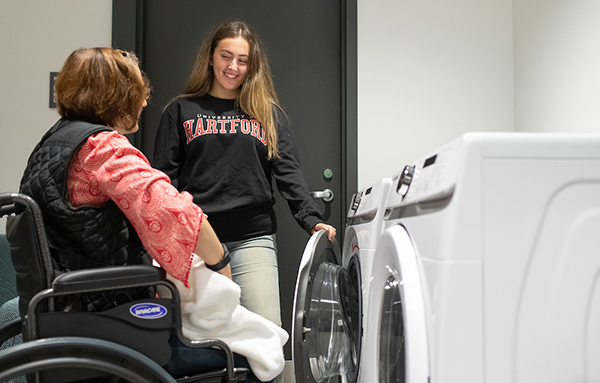About the Major

Occupational therapists help people of all ages live active, productive and independent lives. They can work with young children who have physical disabilities or older adults recovering from a stroke. Occupational therapists make it possible for people to perform “the job of living” and enjoy life to the fullest.
In our five-year BS/MSOT program, you will earn a bachelor’s degree in Health Sciences, which provides the prerequisite science and general education courses that prepare you to move into the professional phase of the program. You will also have two pre-occupational therapy courses during your sophomore and junior years that will give you a preview of OT and help you start thinking about your career.
Once accepted into the combined BS/MSOT program, you will move directly from the undergraduate program into the master's degree professional program without having to re-apply, provided you maintain the required grade point average of 3.0.
The professional program begins during your fourth year and provides a series of foundational science courses, skills laboratories and fieldwork. You will have several integrated fieldwork experiences with specific populations from pediatrics to older adults. The culminating fieldwork experiences are full-time fieldwork during the last semester of the professional program. Graduates of the program will be eligible to sit for the National Board for Certification in Occupational Therapy (NBCOT) exam to become a licensed Occupational Therapist.
Learn more about Occupational Therapy at UHart in this short video with Program Director Sarah Psillas:
Why Study Occupational Therapy?

- A rewarding career: Occupational therapists make a big difference in people’s lives, whether helping someone get back to a favorite hobby, maintain their independence, return to work or school, overcome a cognitive disability or simply lead a normal life. Getting to see your clients’ progress and celebrate their victories is an immensely rewarding experience.
- Strong job outlook: The Bureau of Labor Statistics projects OT jobs to grow 12 percent from 2022 to 2032, much faster than average.
- High salaries: Salary.com reports that the national average salary for a certified occupational therapist with a master’s degree was $97,360 in 2023; in Connecticut the average was $105,000.
- Top career: Occupational therapy is consistently ranked as one of the top careers and best recession-proof jobs. Read more.
What can occupational therapists do?
Occupational therapists help people with health challenges participate in life to the fullest. They may help them learn or re-learn skills like dressing, eating, bathing, preparing meals, driving, and work and leisure activities. From a child with autism to a wounded warrior with a double amputation, this video from our national occupational therapy association AOTA shows the different ways OTs help their clients achieve their goals:
Degree Requirements
The undergraduate phase of the combined BS/MSOT program is a total of 125 credits. A sample of courses is listed below; see the course catalog for the complete curriculum.
GPA Requirements
Science Courses
Introduction to Biology I
College Chemistry I, II
Anatomy & Physiology I, II
Mechanics, Heat and the Body
Pre-OT Seminar I, II
General Education Courses
General education courses may include the following:
Academic Writing I, II
Introduction to Psychology
Business and Professional Communication
Precalculus with Trigonometry
Career Outlook

Occupational therapists are in demand. The Bureau of Labor Statistics expects jobs for occupational therapists to grow 12 percent from 2022 to 2032, much faster than the average for all occupations. Occupational therapy will continue to be an important part of treatment for people with various illnesses and disabilities, such as Alzheimer’s disease, cerebral palsy, autism, or loss of a limb. The need for occupational therapists is expected to remain strong as the U.S. population ages and people with disabilities desire to remain physically active, productive and independent.
US News and World Report recently ranked Occupational Therapy as #4 in the best health care job category and #19 in the best job category!
The Hursey Center
The Francis X. and Nancy Hursey Center for Advanced Engineering and Health Professions offers our Occupational Therapy students state-of-the-art labs and learning spaces. Take a look at our beautiful facilities!
Admission
We offer flexible options for Occupational Therapy Assistants (OTAs) to apply to our program. Contact us for more information.
Freshman applications are reviewed on a rolling basis beginning in late September. If you are a high school student interested in the occupational therapy program, you should complete courses in biology, chemistry, physics, and mathematics with an A or B grade point average.
The University of Hartford implemented a test optional policy in 2018 for applicants who believe that their SAT or ACT scores are not representative of their academic achievements and potential. All students are welcome to apply as test optional and should indicate so on their application. Our test optional policy is consistent with the goal of reviewing each application for admission in a holistic manner.
Please note: A felony conviction may delay or prohibit certification through NBCOT and could prevent state licensure. For more information, refer to www.nbcot.org
Please see the Tuition and Fees page for the most up-to-date information.
Office of Admission and Financial Aid
800.947.4303
admission@hartford.edu
We Are Accredited!

The entry-level occupational therapy master’s degree program is accredited by the Accreditation Council for Occupational Therapy Education (ACOTE) of the American Occupational Therapy Association (AOTA), located at 7501 Wisconsin Avenue, Suite 510E Bethesda, MD 20814. ACOTE’s telephone number c/o AOTA is 301-652-6611 and its web address is www.acoteonline.org. Graduates of the program will be eligible to sit for the national certification examination for the occupational therapist administered by the National Board for Certification in Occupational Therapy (NBCOT). After successful completion of this exam, the individual will be an Occupational Therapist, Registered (OTR). In addition, all states require licensure in order to practice; however, state licenses are usually based on the results of the NBCOT Certification Examination. Note that a felony conviction may affect a graduate’s ability to sit for the NBCOT certification examination or attain state licensure.
NOTE: Students must complete 24 weeks of Level II fieldwork within 24 months following completion of the didactic portion of the program.
Matriculation Year: 2022
Graduation Year: 2023/2024
Students Entering/Students Graduating: 12/11
On-Time Graduation Rate: 100%
Program Contact
Heather Johnson
Program Specialist, Occupational Therapy Program
Department of Rehabilitation Sciences
860-768-5207
hejohnson@hartford.edu